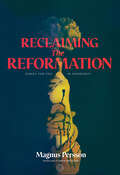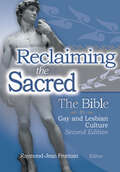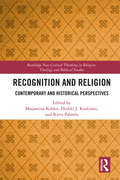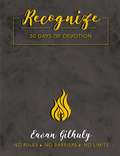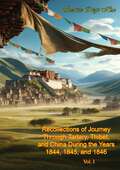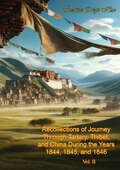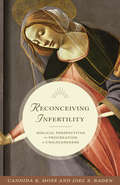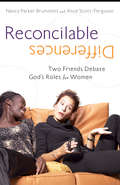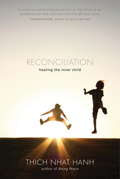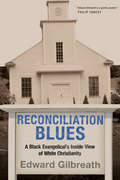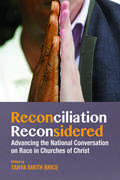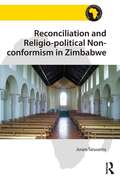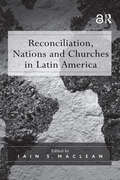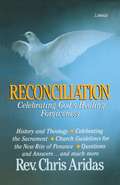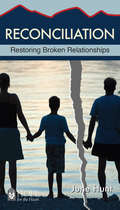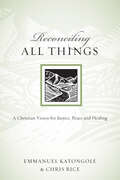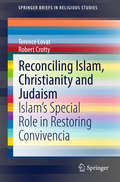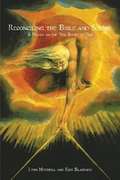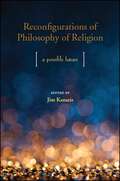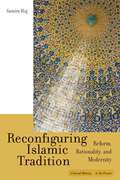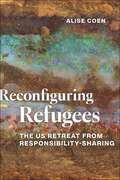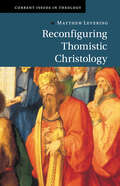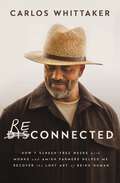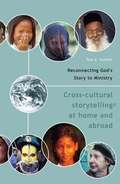- Table View
- List View
Reclaiming the Reformation: Christ for You in Community
by Bror Erickson Magnus PerssonWhat treasures of the reformation can pastors, Christians and the church make use of today when trying to navigate burnout and scandal? What should a person look for in a church? Magnus Persson examines his own journey from popular preacher where church was a party, to the Lutheran faith and a pastor in the Church of Sweden where he relishes the liturgy nourished by historic roots using Luther's book "On Council's and the Church" to answer this question and explain his journey.Originally titled Christ's Church, On the Marks of the Church Magnus shows the influence of Bo Giertz but also draws on many different influences from within and without the Lutheran tradition to explain how everything the church does needs to be focused on Christ crucified for you. Church is about communicating the forgiveness of sins Christ won for you on the cross to you. The church does this through the word, the liturgy, and the sacraments. Through these means the soul is nourished and matured to handle the distress and tribulation with which the world harries the church and her people. Here true rest is found for the souls of pastors battered by the pressure to be the next biggest church in town before they burnout and check out with scandal.
Reclaiming the Sacred: The Bible in Gay and Lesbian Culture, Second Edition
by Raymond J FrontainThe second edition of Reclaiming the Sacred: The Bible in Gay and Lesbian Culture continues the groundbreaking work of the original, exploring the territory between gay/lesbian studies, literary criticism, and religious studies. This much-anticipated follow-up examines the appropriation and/or subversion of the authority of the Judeo-Christian Bible by gay and lesbian writers. The book highlights two prevalent trends in gay and lesbian literature-a transgressive approach that challenges the authority of the Bible when used as an instrument of oppression, and an appropriative technique that explores how the Bible contributes to defining gay and lesbian spirituality. Reviewers of the first edition of Reclaiming the Sacred hailed the book&’s enterprise in exploring the area between literary criticism and religious studies. Whereas contemporary literary-critical theory has been slow to integrate religion and religious history into queer theory, this pioneering journal has addressed the issue from the start with a collection of thoughtful and though-provoking articles. This latest edition expands coverage to include noncanonical ancient texts, popular Victorian religious texts, and contemporary theater. Academics and lay readers interested in literary criticism, cultural studies, and religious studies will gain new insights from topics such as: religious mystery and homosexual identity in Terrence McNally&’s "Corpus Christi" same-sex biblical couples in Victorian literature homoerotic texts in the Apocrypha sodomite rhetoric in a seventeenth-century Italian text Radclyffe Hall&’s lesbian messiah in her 1928 novel The Well of Loneliness homosexual temptation in John Milton&’s Paradise Regained Reclaiming the Sacred counteracts the manipulative and oppressive uses to which modern writers and thinkers put the Bible and the "morality" it is presumed to inscribe. An important tool for understanding the role of the Bible in gay and lesbian culture, this remarkable book makes a powerful contribution to the advancement of studies on queer sanctity.
Recognition and Religion: Contemporary and Historical Perspectives (Routledge New Critical Thinking in Religion, Theology and Biblical Studies)
by Maijastina Kahlos Heikki J. Koskinen Ritva PalménThis book focuses on recognition and its relation to religion and theology, in both systematic and historical dimensions. While existing research literature on recognition and contemporary recognition theory has been gradually growing since the early 1990s, certain gaps remain in the field covered so far. One of these is the multifaceted interaction between the phenomena of recognition and religion. Since recognition applies to persons, institutions, and normative entities like systems of beliefs, it also provides a very useful analytic and interpretative tool for studying religion. Divided into five sections, with chapters written by established scholars in their respective fields, the book explores the roots, history, and limits of recognition theory in the context of religious belief. Exploring early Christian and medieval sources on recognition and religion, it also offers contemporary applications of this underexplored combination. This is a timely book, as debates over religious identities, problematic forms of extremism and societal issues related with multiculturalism continue to dominate the media and politics. It will, therefore, be of great interest to scholars of recognition studies as well as religious studies, theology, philosophy, and religious and intellectual history.
Recognize: 50 Days of Devotion
by Eavan GilhulyEavan Gilhuly, a graduate of Desert Christian Academy in Bermuda Dunes, CA has written an inspirational and heartfelt devotional, a publication that provides a specific spiritual reading for each calendar day. Gilhuly says the book, entitled Recognize, was penned as a tribute to her graduating class of 2019, and she presented it to them at a recent retreat.The book is structured so that each devotional day begins with a Bible verse, followed by Gilhuly's thoughts and feelings about that verse and then a subsequent journal prompt. She says it was her pastor who suggested the format, with an emphasis on "God," then "you," and then "them." While she enjoyed writing each of the fifty entries, Gilhuly says her favorite devotional is Day #3: Lamentations 3:22-23, a passage focused on God&’s faithfulness, mercies and promises.A lifelong desert resident, Gilhuly plans to study nursing at Northwest University, a top-ranked Christian college near Seattle, in the fall. She does not rule out a follow up to Recognize but acknowledges the next book would likely be a different type of devotional.To learn more about Eavan Gilhuly and her devotional Recognize, visit www.Eavan-NoLimits.com
Recollections of Journey Through Tartary, Thibet, and China During the Years 1844, 1845, and 1846 Vol. I (Recollections of Journey Through Tartary, Thibet, and China During the Years 1844, 1845, and 1846 #1)
by Évariste Régis Huc"Recollections of Journey Through Tartary, Thibet, and China During the Years 1844, 1845, and 1846" by Evariste Huc is an enthralling travel memoir that chronicles the author's remarkable expedition across some of the most remote and fascinating regions of Asia. Evariste Huc, a French missionary, provides an extraordinary firsthand account of his adventures and observations as he traversed the vast landscapes of Tartary (Central Asia), Tibet, and China during the mid-19th century.Huc's narrative is rich with vivid descriptions of the diverse cultures, peoples, and landscapes he encountered on his journey. From the vast steppes of Tartary to the majestic heights of the Tibetan plateau, and the intricate social fabric of imperial China, Huc's keen eye for detail and deep curiosity bring these distant lands to life. His encounters with nomadic tribes, Buddhist monks, and Chinese officials offer readers a rare glimpse into the lives and customs of these regions during a time of limited Western influence."Recollections of Journey Through Tartary, Thibet, and China" is more than just a travelogue; it is a valuable historical document that captures a pivotal moment in the cultural and political landscapes of Asia. Huc's reflections on the religious practices, political structures, and daily life of the people he met provide a comprehensive and nuanced understanding of these regions.Evariste Huc's eloquent and engaging writing style, combined with his perceptive insights and adventurous spirit, makes this book a timeless classic in the genre of travel literature. It is an essential read for historians, geographers, and anyone with an interest in the rich tapestry of Asian cultures and the history of exploration. Through Huc's eyes, readers are transported to a bygone era, experiencing the wonders and challenges of a journey through some of the most remote and mystical parts of the world.
Recollections of Journey Through Tartary, Thibet, and China During the Years 1844, 1845, and 1846 Vol. II (Recollections of Journey Through Tartary, Thibet, and China During the Years 1844, 1845, and 1846 #2)
by Évariste Régis Huc"Recollections of Journey Through Tartary, Thibet, and China During the Years 1844, 1845, and 1846" by Evariste Huc is an enthralling travel memoir that chronicles the author's remarkable expedition across some of the most remote and fascinating regions of Asia. Evariste Huc, a French missionary, provides an extraordinary firsthand account of his adventures and observations as he traversed the vast landscapes of Tartary (Central Asia), Tibet, and China during the mid-19th century.Huc's narrative is rich with vivid descriptions of the diverse cultures, peoples, and landscapes he encountered on his journey. From the vast steppes of Tartary to the majestic heights of the Tibetan plateau, and the intricate social fabric of imperial China, Huc's keen eye for detail and deep curiosity bring these distant lands to life. His encounters with nomadic tribes, Buddhist monks, and Chinese officials offer readers a rare glimpse into the lives and customs of these regions during a time of limited Western influence."Recollections of Journey Through Tartary, Thibet, and China" is more than just a travelogue; it is a valuable historical document that captures a pivotal moment in the cultural and political landscapes of Asia. Huc's reflections on the religious practices, political structures, and daily life of the people he met provide a comprehensive and nuanced understanding of these regions.Evariste Huc's eloquent and engaging writing style, combined with his perceptive insights and adventurous spirit, makes this book a timeless classic in the genre of travel literature. It is an essential read for historians, geographers, and anyone with an interest in the rich tapestry of Asian cultures and the history of exploration. Through Huc's eyes, readers are transported to a bygone era, experiencing the wonders and challenges of a journey through some of the most remote and mystical parts of the world.
Recommended for You
by Laura SilvermanShoshanna Greenberg loves working at Once Upon, her favorite local bookstore. And with her moms fighting at home and her beloved car teetering on the brink of death, the store has become a welcome escape. When her boss announces a holiday bonus to the person who sells the most books, Shoshanna sees an opportunity to at least fix her car, if none of her other problems. The only person standing in her way? New hire Jake Kaplan. Jake is an affront to everything Shoshanna stands for. He doesn&’t even read! But somehow his sales start to rival hers. Jake may be cute (really cute), and he may be an eligible Jewish single (hard to find south of Atlanta), but he&’s also the enemy, and Shoshanna is ready to take him down. But as the competition intensifies, Jake and Shoshanna grow closer and realize they might be more on the same page than either expects…
Reconceiving Infertility
by Joel S. Baden Candida R. MossIn the Book of Genesis, the first words God speaks to humanity are "Be fruitful and multiply." From ancient times to today, these words have been understood as a divine command to procreate. Fertility is viewed as a sign of blessedness and moral uprightness, while infertility is associated with sin and moral failing. Reconceiving Infertility explores traditional interpretations such as these, providing a more complete picture of how procreation and childlessness are depicted in the Bible.Closely examining texts and themes from both the Hebrew Bible and the New Testament, Candida Moss and Joel Baden offer vital new perspectives on infertility and the social experiences of the infertile in the biblical tradition. They begin with perhaps the most famous stories of infertility in the Bible--those of the matriarchs Sarah, Rebekah, and Rachel--and show how the divine injunction in Genesis is both a blessing and a curse. Moss and Baden go on to discuss the metaphorical treatments of Israel as a "barren mother," the conception of Jesus, Paul's writings on family and reproduction, and more. They reveal how biblical views on procreation and infertility, and the ancient contexts from which they emerged, were more diverse than we think.Reconceiving Infertility demonstrates that the Bible speaks in many voices about infertility, and lays a biblical foundation for a more supportive religious environment for those suffering from infertility today.
Reconcilable Differences
by Nancy Parker Brummett Alice Scott-FergusonAlice: "Men and women are completely of equal value. Their biological differences do not detract from that equal status." Nancy: "Men and women are equally valued by God, but are assigned different roles." Who do you agree with? Finally, an open discussion of women's roles between two strong, intelligent Christian women. In a fun and unique way, Reconcilable Differences presents honest answers to the perplexing questions all women ask, such as, "What does submission mean?" "What's a woman's role inside the church?" and "Can a Christian be a feminist?" By revealing to one another the fallacies in gender stereotypes, authors Nancy and Alice show that it is possible to live, love, and be at liberty to disagree without breaking the bond of unity in the body of our Lord Jesus Christ.
Reconciliation
by Thich Nhat HanhBased on Dharma talks by Zen Master Thich Nhat Hanh and insights from participants in retreats for healing the inner child, this book is an exciting contribution to the growing trend of using Buddhist practices to encourage mental health and wellness. Reconciliation focuses on the theme of mindful awareness of our emotions and healing our relationships, as well as meditations and exercises to acknowledge and transform the hurt that many of us experienced as children. The book shows how anger, sadness, and fear can become joy and tranquility by learning to breathe with, explore, meditate, and speak about our strong emotions. Reconciliation offers specific practices designed to bring healing and release for people suffering from childhood trauma. The book is written for a wide audience and accessible to people of all backgrounds and spiritual traditions.
Reconciliation Blues: A Black Evangelical's Inside View of White Christianity
by Edward GilbreathWhat is the state of racial reconciliation in evangelical churches today? Are we truly united? In Reconciliation Blues journalist Edward Gilbreath gives an insightful, honest picture of both the history and the present state of racial reconciliation in evangelical churches. In his thoughtful overview he looks at a wide range of figures, such as Howard O. Jones, Tom Skinner, Dr. Martin Luther King Jr., Jesse Jackson and John Perkins. Charting progress as well as setbacks, his words offer encouragement for black evangelicals feeling alone, clarity for white evangelicals who want to understand more deeply, and fresh vision for all who want to move forward toward Christ's prayer "that all of them may be one." Now in paper!
Reconciliation Reconsidered: Advancing the National Conversation on Race in Churches of Christ
by Tanya Smith BriceReconciliation Takes Time.A broad racial divide mars Churches of Christ, and courageous leaders from across the United States have joined together to listen to one another. Rather than adopt a posture of resignation, they have met for honest, God-honoring conversation.In Reconciliation Reconsidered, Tanya Brice pulls together the early fruit she has gleaned from this ongoing conversation about racial reconciliation. Learn about yourself in the context of community as you explore these key ideas:•Exercise truth-telling: it's what is needed before any reconciliation can happen•Discover how race relations are not as simple as you think•Challenge your stereotypes•Understand the meaning of current events like the Ferguson shooting in fresh ways•Revisit Christ's teachings with a careful eye toward discipleship and love of your neighbor•Each chapter concludes with discussion questions that can help you and others navigate this perplexing and difficult topic.
Reconciliation and Religio-political Non-conformism in Zimbabwe (Religion in Modern Africa)
by Joram TarusariraReligio-political organisations in Zimbabwe play an important role in advocating democratisation and reconciliation, against acquiescent, silenced or co-opted mainstream churches. Reconciliation and Religio-political Non-conformism in Zimbabwe analyses activities of religious organisations that deviate from the position of mainline churches and the political elites with regard to religious participation in political matters, against a background of political conflict and violence. Drawing on detailed case studies of the Zimbabwe Christian Alliance (ZCA), Churches in Manicaland (CiM) and Grace to Heal (GtH), this book provocatively argues that in the face of an unsatisfactory religious and political culture, religio-political non-conformists emerge seeking to introduce a new ethos even in the face of negative sanctions from dominant religious and political systems.
Reconciliation, Nations and Churches in Latin America
by Iain S. MacleanThis book examines the recent phenomenon in Latin America of national Truth and Reconciliation commissions. Few studies have examined the role of Churches or religion in political processes that proclaim valued theological terms as their agenda - truth, forgiveness, and reconciliation. This book questions the role of religion, specifically of established Churches. The impact of such reconciliation commissions on Indigenous Native Americans is also examined, as is the role of women and how both commissions and Churches or religions were challenged by their experiences. The contributors offer differing perspectives on one or more national truth and reconciliation processes and thus offer a collection that serves as valuable source for the disciplines of Religious Studies, Ethics, Theology, Political Science, Social Sciences and Women's Studies.
Reconciliation: Celebrating Gods Healing Forgiveness
by Chris AridasCelebrating God's healing forgiveness
Reconciliation: Restoring Broken Relationships (Hope for the Heart)
by June HuntSarcasm. Hurt feelings. Misunderstanding. Alienation. When hurt people connect with other hurt people, relationship breakdowns are sure to occur. Why is it so hard to patch things up? Who should make the first move? This 96-page book on reconciliation tackles how to forgive the "un-forgivable," how to move past the hurt, and how to restore relationships by restoring trust. What is Reconciliation? 3 Core Truths about Broken Relationships and Reconciliation• Forgiving someone is not the same as reconciliation. • Unforgiveness is the root of unresolved conflict. • Reconciliation is a restored relationship based on restored trust. Even when there are valid reasons to feel hurt and even when the other person is undeserving, the spirit of reconciliation reflects the heart of God. Find out what you need to know about reconciliation and healing in relationships. It includes—•Definition Section on Reconciliation, Restoration, and MediationDiscover the real truth that with God there is no relationship that cannot be restored. Review key definitions and encouraging Bible stories that show God's heart and desire for reconciliation and forgiveness. Covers key Bible stories, such as David, Joseph and his brothers, Abigail, and Jesus. "Even though God has set the standard for forgiveness and reconciliation, the reality of conflicts and personal offenses raises questions—questions Ms. Hunt addresses. Is there a difference between forgiveness and reconciliation? Must forgiveness result in reconciliation? The story of Joseph’s reconciliation with the brothers who had abused him and sold him as a slave is one of several stories the author recounts to illustrate the grace and mercy required to restore severed relationships."—Dave Barkey, Retired Pastor, Colorado,Team Rose Representative
Reconciling All Things: A Christian Vision for Justice, Peace and Healing (Resources for Reconciliation)
by Chris Rice Emmanuel KatongoleChristianity TodayOur world is broken and cries out for reconciliation.But mere conflict resolution and peacemaking are not enough. What makes real reconciliation possible? How is it that some people are able to forgive the most horrendous of evils? And what role does God play in these stories? Does reconciliation make any sense apart from the biblical story of redemption?Reconciling All ThingsThis powerful, concise book lays the philosophical foundations for reconciliation and explores what it means to pursue hope in areas of brokenness in theory and practice.
Reconciling Islam, Christianity and Judaism
by Terence Lovat Robert CrottyAt the present time, when so-called Islamic radicalism, terrorism and Jihadism occupy major media space, with Islam often depicted as the main culprit, the book attempts a tour de force. It proposes that Islam is as much victim as culprit in the history that has led to the current hostility. This is because the common claims of both mainstream and radical Islam that Islam represents the high point of the Abrahamic tradition, and therefore a purification of Judaism and Christianity, have been largely ignored, misunderstood or blatantly rejected by these faiths and therefore by 'the West' in general. This rejection has effectively rendered Islam as the poor cousin, if not the illegitimate sibling, of the tradition. In turn, this has created long-term resentment and hostility within Islam as well as robbed the 'Judaeo-Christian West' of a rich, inter-faith understanding of the wider Abrahamic tradition. The book explores these claims through textual, historical and theological analyses, proposing that many of them stand up better to critical scrutiny than has been commonly acknowledged. It further proposes that seeing Islam in this way has potential to re-awaken its self-understanding as a leader of accord among the Abrahamic faiths, of the kind that characterized the era of Convivencia when, in medieval Spain, Islam constructed and contributed to advanced civilizations characterized by relatively harmonious co-existence between Muslims, Christians and Jews. The book focuses on the role that a more respected and self-confident Islam could play in forging enhanced inter-faith relations in a world that desperately needs them as it struggles to understand and deal with modern and particularly vicious forms of radical Islamism.
Reconciling the Bible and Science: A Primer on the Two Books of God
by Kirk Blackard Lynn MitchellReconciling the Bible and Science acknowledges the Bible as the word of God, demonstrates why there is no conflict between the Bible and science, and shows readers how to accept both.
Reconfigurations of Philosophy of Religion: A Possible Future
by Jim KanarisThis collection addresses, as it exemplifies, an identity crisis in contemporary philosophy of religion. It represents a unique two-way dialogue between philosophers of religion and scholars of religion and broaches issues pertaining to the philosophy of religion and the philosophical tradition, on the one hand, and religious studies, theology, and the modern academy on the other. While each author manages the current challenges in philosophy of religion differently, one can nonetheless discern a polyphony of interests surrounding a postcritical, postsecular appreciation of religion. In part 1, contributors ask how philosophy of religion can accommodate both the strengths and weaknesses of Western analytic and continental traditions; incorporate developments in ideology critique, gender studies, and Asian philosophies; and negotiate the perceived stalemate in philosophy of religion. Part 2 addresses these questions in terms of a philosophy of religion that is postcolonial in intention and multidisciplinary in orientation and features scholarship from the fields of both religion and theology. An underlying theme is the importance of ushering philosophy of religion into a postphenomenological era of religious studies and theology. This is a neglected dimension in many laudable discussions about philosophy of religion that this volume hopes to emend.
Reconfiguring Islamic Tradition
by Samira HajHaj (history, City U. of New York-Graduate Center) analyzes the work of two significant Muslim reformers that many consider to have inspired the two major strands of contemporary Islamic political thought. One is Muhammed ibn Abdul Wahhab (1703-87), whose work inspires groups like al-Qa'ida; the second is Egyptian reformer Muhammad 'Abduh (1849-1905). Western scholarship labels the first fundamentalist and traditional, and the second liberal and modern, but he looks at both of their ideas in terms of their own political goals, not that of Western powers. Annotation ©2009 Book News, Inc. , Portland, OR (booknews. com)
Reconfiguring Refugees: The US Retreat from Responsibility-Sharing
by Alise CoenShows how domestic identity narratives and political polarization shape the sociopolitical response to refugeesThe United States once played a major role in global refugee resettlement, accounting for nearly two-thirds of all refugees resettled worldwide. However, in recent years, it has dramatically cut refugee admissions and implemented discriminatory policies on refugee protection. These policies have been justified amid intensifying xenophobic rhetoric against specific groups.In this book, Alise Coen explains why the monumental shift around refugee resettlement occurred, particularly in response to the high-profile conflict in Syria. She shows how refugees—and broader global migration debates—became contentious political issues in the US, revealing the many ways in which refugees have been increasingly weaponized as partisan symbols by Democrats and Republicans. The book calls attention to the power of rhetoric and identity narratives, and shows how the language used to talk about refugees fuels divisivepolicies.From the years leading up to the Trump administration’s policies targeting Muslim refugees to debates during the Biden administration around who deserves access to asylum, Coen examines how ideas about race, gender, and nativism shape US approaches toward migration. As arguments for “closing the border” continue to gain traction and politicians continue to use global displacement issues to further their agendas, Reconfiguring Refugees explores the ideas, meanings, and policies that undermine and influence US responsibility-sharing.
Reconfiguring Thomistic Christology (Current Issues in Theology)
by Matthew LeveringIn this book, Matthew Levering unites eschatologically charged biblical Christology with metaphysical and dogmatic Thomistic Christology, by highlighting the typological Christologies shared by Scripture, the Church Fathers, and Aquinas. Like the Church Fathers, Aquinas often reflected upon Jesus in typological terms (especially in his biblical commentaries), just as the New Testament does. Showing the connections between New Testament, Patristic, and Aquinas' own typological portraits of Jesus, Levering reveals how the eschatological Jesus of biblical scholarship can be integrated with Thomistic Christology. His study produces a fully contemporary Thomistic Christology that unites ressourcement and Thomistic modes of theological inquiry, thereby bridging two schools of contemporary theology that too often are imagined as rivals. Levering's book reflects and augments the current resurgence of Thomistic Christology as an ecumenical project of relevance to all Christians.
Reconnected: How 7 Screen-Free Weeks with Monks and Amish Farmers Helped Me Recover the Lost Art of Being Human
by Carlos WhittakerUSA TODAY BESTSELLERChange your relationship with technology. Change your life.Share. Post. Reply…Most of us have gotten so used to notifications and alerts, pings and rings, that even if we don't want to be on our phones so much, we don't know what to do about it. The constant flow of information affects our brains, relationships, and emotional well-being. We feel stuck, overwhelmed, overstimulated, and we want a way out.Like many of us, podcaster and author Carlos Whittaker had lived for years in an always-on, always-connected world—and he felt more disconnected than ever from God, his community, and even himself. When Carlos Whittaker realized how many hours he was on his phone, he took extreme measures to see how unplugging could change his body and soul.In Reconnected, Carlos shares the challenges, surprises, and profound insights of his self-imposed exile from technology, spending nearly two months screen-free at a monastery, an Amish farm, and at home. As you journey with Carlos through this life-changing experiment you will discover:how to retrain yourself to notice the world before you notice your texts;what technology does to your brain and what you can do about it;ways to prioritize in-person relationships even if you need screens for work or school;why turning down your phone's volume turns up God's voice in your life;the newfound joy of being bored, getting lost, and not having to Google every question that comes to your mind. Blending wisdom from the past, practices of intentionality and community, and Whittaker's signature engaging communication style, Reconnected will inspire and equip you to reset your life in a tech-saturated world. It's time to take back control of your life from technology and recover the lost art of being human. You were made for more. This is how you start living again.
Reconnecting God's Story to Ministry: Cross-Cultural Storytelling at Home and Abroad
by Tom A. SteffenThis book will introduce practical ways to increase many of the storytelling skills for evangelism-discipleship among those of like culture.
